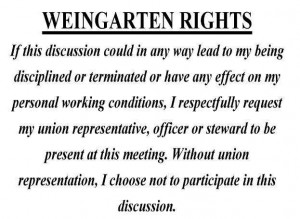Weingarten Rights are specific rights an employee has in regards to being questioned and interrogated about any workplace incident by management that may lead to adverse job consequences or disciplinary action.
It is YOUR responsibility to know these rights, as it is not the employers duty to inform you of them!
It is YOUR right not to answer questions of management that are investigatory or coersive without a union representative present. It does not have to be YOUR steward, but any union officer you designate.
A union officer can: 1) Offer advice on how you may answer questions; 2) assist the employee in avoiding insubordination claims and making a fatal or emotional admission; 3) object to intimidating or over aggressive conduct by management; 4) Insure that a precise record of the interview is kept and that an employees answers aren’t distorted or taken out of context; 5) the union representative can also point out to management any extenuating circumstances involved, or what past precedence has been.
Not all employee interviews fall under Weingarten Rights. Casual conversations that are non-threatening or just run-of-the-mill, are not covered.
However, if during a candid or seemingly casual conversation management would seek information that may result in adverse consequences or possible disciplinary actions, Weingarten Rights would apply.
Management saying, “we are only interested in finding out what happened,” does not release them from obeying the rights Weingarten gaurentees you.
Once you make a Weingarten request. the employer has only three choices:
1. Halt all questioning until a union representative arrives.
2. End the interview
3. Offer the employee a choice of continuing the interview without representation (not recomended)
If the employer refuses an employee’s Weingarten request and continues the interview, the employee may choose not to answer and the employer may be guilty of an unfair labor practice and risk the union bringing a complaint of such before the National Labor Relations Board.

